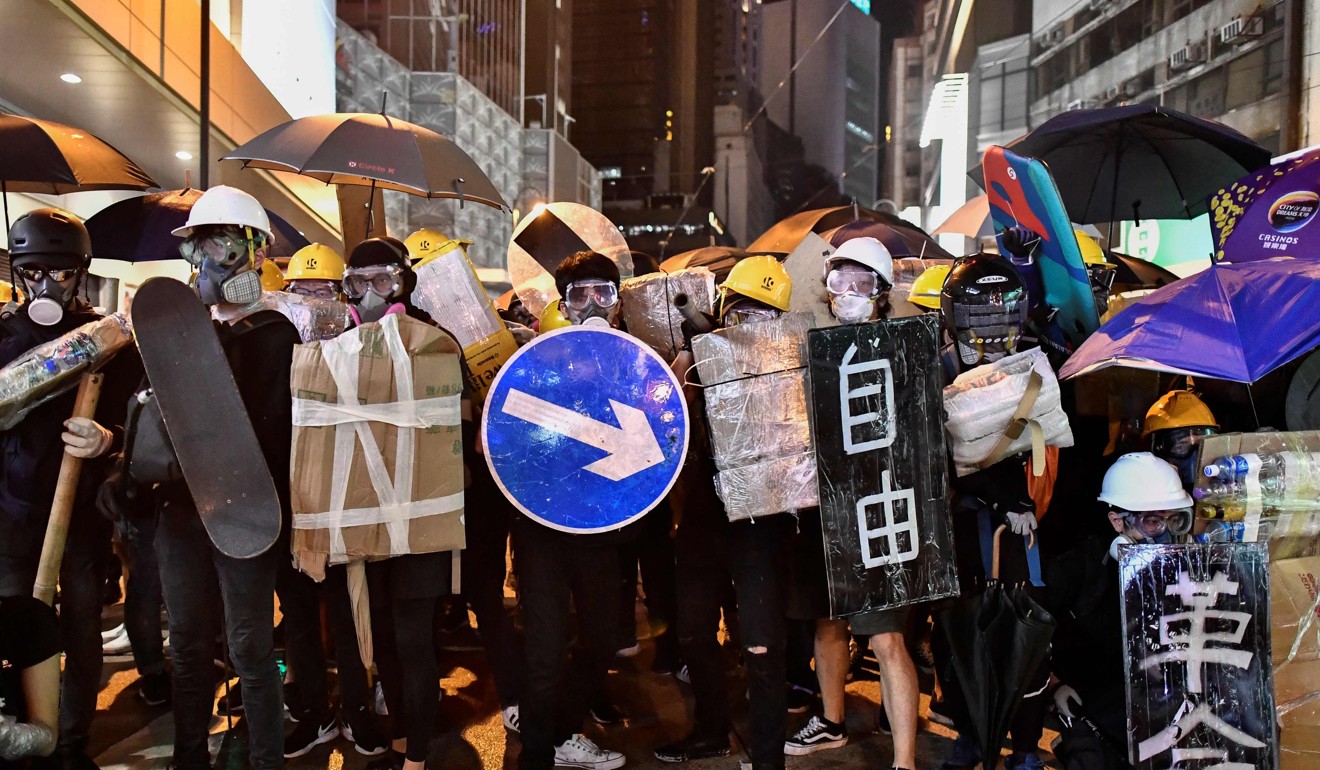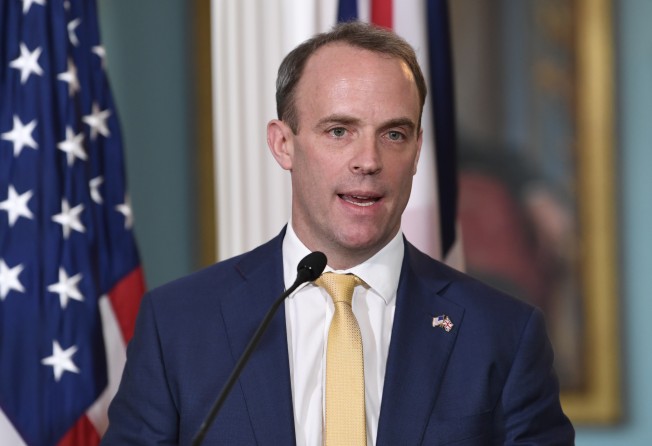
China says it was ‘a mistake’ for British Foreign Secretary Dominic Raab to call Hong Kong leader Carrie Lam
- Beijing describes conversation as move to ‘exert pressure’ on city’s chief executive and tells Britain to ‘stop intervening in China’s internal affairs’
- Raab had called on Lam to start an independent investigation into recent events ‘as a way to build trust’ – something she has so far refused to do

Beijing said it was “a mistake” for Britain’s new Foreign Secretary Dominic Raab to call Hong Kong Chief Executive Carrie Lam Cheng Yuet-ngor, describing it as a move to “exert pressure on her” and calling on the country to stop “intervening in China’s internal affairs”.
“Today Hong Kong is a special administrative region of the People’s Republic of China, it hasn’t been a British colony for a long time,” foreign ministry spokeswoman Hua Chunying said in a statement on Saturday.
“China solemnly demands that Britain stop interfering in Hong Kong and China’s internal affairs and stop making comments and stirring up trouble,” Hua said.
Britain had “no sovereignty and no rights of governance or supervision over Hong Kong”, she said.
The Chief Executive’s Office said Lam spoke with Raab on the phone for over 20 minutes on Friday morning at the request of the British consulate in Hong Kong, their first call since Raab took up the job in late July.
Lam told Raab that while the Hong Kong government “respects the diverse views held by members of the public on various issues as well as the freedoms of speech and assembly, it will not let violence and illegal behaviours disrupt public order”, according to the office.

The British foreign secretary called for the rights of peaceful protests by the majority to be respected. Raab told Lam violent scenes should not undermine the right to peaceful protest, days after she redefined the anti-government demonstrations as a threat to Beijing’s sovereignty.
“The foreign secretary condemned violent acts by all sides but emphasised the right to peaceful protest, noting that hundreds of thousands of Hong Kong people had chosen this route to express their views,” according to a statement from the Foreign and Commonwealth Office.
“He underlined that the violence should not cloud the lawful actions of the majority.”
Lam’s office said during the conversation, she had stressed that “one country, two systems” had been successfully implemented in Hong Kong since the handover in 1997 and that the rule of law was a core value of the city.
“She also mentioned to Mr Raab the work being done by the Independent Police Complaints Council in accordance with its statutory functions,” the statement said.
It added that Lam had briefed Raab on the background to the now-shelved extradition bill that triggered the protests and unrest seen in Hong Kong since early June, stressing that the proposed legislation had come to “a complete stop”.
Raab suggested the chief executive launch a “fully independent investigation into recent events as a way to build trust”, something Lam has so far refused to do, instead referring complaints over the police’s use of force against protesters to the Independent Police Complaints Council, a body under the Hong Kong government.
The comments by Raab, essentially the second most powerful figure in British politics after Prime Minister Boris Johnson, follow a diplomatic tit-for-tat between Beijing and Washington over a US diplomat’s meeting with student activists who China branded as “supporters of Hong Kong independence”.
China and the US traded barbs after pro-Beijing newspaper Ta Kung Pao on Thursday published personal details of Hong Kong-based US diplomat Julie Eadeh, including the names of her children, and a photograph of her meeting pro-democracy activists in the city. The foreign ministry commissioner’s office in Hong Kong lodged a formal complaint with the US consulate over the meeting, while mainland media used it as evidence for Beijing’s narrative that foreign forces were behind the protests and violent clashes.
Lam redefined the nature of the protests on Monday, saying demonstrators were involved in what she called an attack on Beijing’s sovereignty. The shift led political observers to worry that the already heightened tensions between the government and its opponents could worsen.
“This series of extremely violent acts is pushing Hong Kong to a very dangerous situation, some extreme activists have altered the nature of these [protests], resorting to violent means to express their aspirations,” Lam said.
“These actions challenge national sovereignty, threaten one country, two systems, and will destroy the city’s prosperity and stability,” she said, referring to slogans of “Liberate Hong Kong, revolution of our times” and the act of throwing a Chinese flag in the sea.
The anti-government protests have broadened over the past two months beyond the original call – to withdraw a bill that would allow criminal extraditions from Hong Kong to mainland China – into a wider pro-democracy movement.
Meanwhile, Beijing has sought to step up engagement with Europe to present its line on Hong Kong. Its European envoys have been active in calling for violence in the city to be condemned.
In the phone call with Lam, made during a flight from Mexico to Britain, Raab also underlined the strength of the relationship between Britain and Hong Kong. He highlighted “our support for Hong Kong’s high degree of autonomy as provided for in the Joint Declaration and our commitment to the principle of one country, two systems”.
But he stopped short of making the clear statement delivered by his predecessor, Jeremy Hunt, that the Joint Declaration – reached in 1984 between Chinese leader Deng Xiaoping and British prime minister Margaret Thatcher – remained valid.
Additional reporting by Kanis Leung